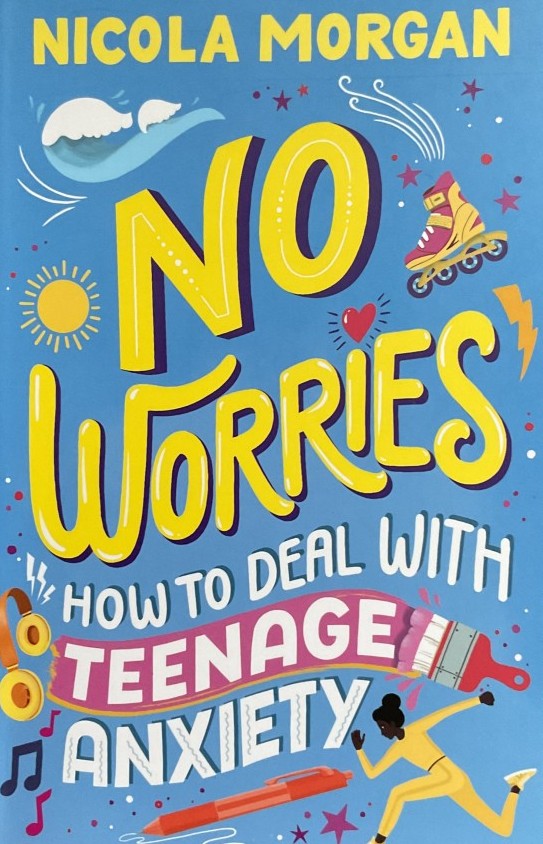Inspiring Young Readers
 posted on 27 Aug 2023
posted on 27 Aug 2023
No Worries by Nicola Morgan
On the eve of my fourteenth birthday many years ago I can remember thinking ‘That was the worst year of my life so far’. Most of my teenage anxieties were the usual ones about how others saw me and especially why I seemed to be blighted with acne when other girls of my age had flawless skins. But I can also remember being troubled by societal injustice, particularly homelessness which was just beginning to be highlighted with the showing of ‘Cathy Come Home’ on the TV in my living room.
I can only imagine how similarly sensitive souls must be affected by constant information about climate change, other environmental concerns, the cost-of-living crisis and, of course, the recent pandemic. The author explains that a survey by Oxford University Press in 2021 recorded that the word ‘anxiety’ was most common word used by young people when talking about health and well-being. One of the hardest things to decide as a parent is just how much reassurance needs to be given about all this big stuff. Dealing with the personal problems of puberty is surely bad enough?
This is a book that provides some very positive and practical strategies about teenage anxiety and promises that ’even when you can’t change what’s going on around you, you can change how you cope with it. And that you can even grow from it and be stronger for your future.’
It is organised into three clear sections which the author recommends need to be read in the right order to be effective.
Part One: Anxiety and YOU
This section provides some reassurance that getting anxious sometimes is part of being human but then moves onto the needs of the individual reader through using a range of quizzes that might be familiar through reading magazines. The message is that, even if one doesn’t score highly on the anxiety scale, it might be useful to understand the subject better in order to help others. It concludes by suggesting several ways in which reflecting on successful management of anxiety might improve quality of life eg ‘I would be able to switch off and enjoy relaxing times such as holidays.’
Part Two: All about Anxiety
This section moves onto the biological reasons behind anxiety and how the brain and body can react to external and internal threats by causing adrenalin and cortisol surges with immediate effects. It goes onto explain the differences between anxiety and stress and how they are interrelated. It outlines how anxiety can be useful in staying safe and taking time to make difficult decisions. It provides a succinct overview of how individual levels of anxiety can be influenced by genes, personality traits, who we spend time with, and adverse childhood experiences. There is some relevant attention given to the ‘big five personality traits that most experts believe are more or less fixed throughout our lives.’
I liked the way in which the author provides reassurance at every stage and sometimes acknowledges that the focus on trying to understand anxiety can have a negative effect on the reader. It also gives links to pages with support strategies for more concerning conditions such as panic attacks, phobias and Obsessive Compulsion Disorder. The concluding part warns against developing negative coping strategies and also makes the point that seeking professional help might be a good idea to pursue in some cases.
Part Three: Strategies and Solutions
From the outset the author uses the metaphor of a guard dog to describe how anxiety can be successfully managed. This final section focusses on how to ‘tame your guard dog and make it your safe companion, living peacefully outside your home and not bothering you’.
She provides a framework of helpful strategies which are cross referenced to relevant page numbers in the book. I must confess to finding this detail rather overwhelming and am not sure how easy it would be to make an individual plan. But I daresay that a reader who was experiencing anxiety and needing to find ways to cope would invest the necessary time but I think might benefit from the help of a sympathetic friend or adult to complete effectively. She also suggests using the useful acronym START which stands for Stop, Take Stock, Acknowledge, Relax and Take Action plus some useful instant actions, breathing and grounding strategies.
This is a comprehensive and very interesting overview of a complex subject which is not a book to be read from cover to cover. It is also written in a friendly and accessible style which will appeal to many individual teenagers and their parents. I can also see how it could be usefully used as part of a PSHE curriculum or as an addition to psychology and counselling course texts at school and in Further and Higher Education.
Available from Walker Books, you will be able to get a copy from your local independent bookshop - who will be happy to order it for you if they don't have a copy on their shelves.
Karen Argent
August 2023